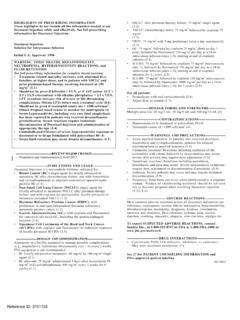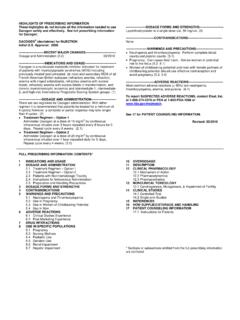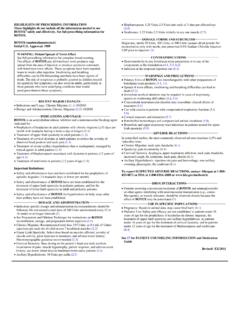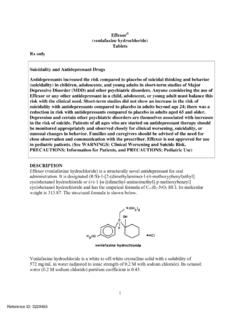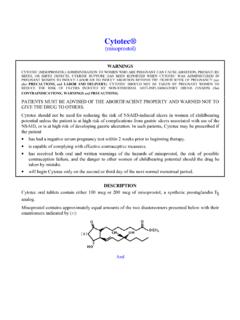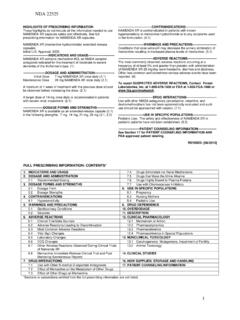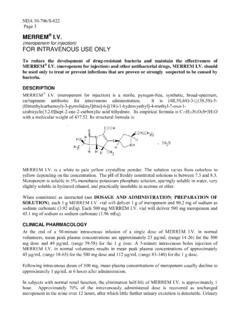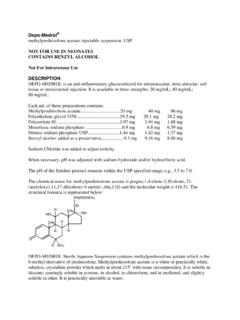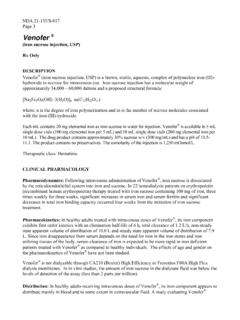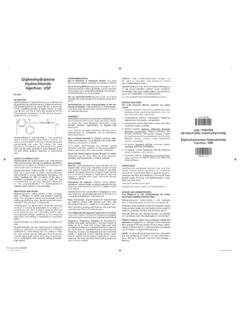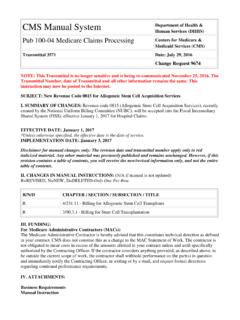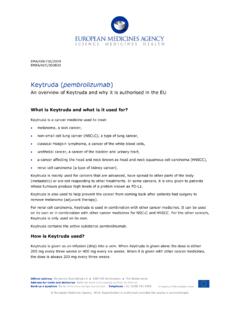Transcription of Reference ID: 3662552
1 HIGHLIGHTS OF PRESCRIBING INFORMATION. --------------------------------Contrain dications----------------------------- . These highlights do not include all the information needed to use ADCETRIS safely and effectively. See full prescribing information for Concomitant use with bleomycin due to pulmonary toxicity (4). ADCETRIS. ------------------------------- Warnings and Precautions --------------------------- ADCETRIS (brentuximab vedotin) for injection, for intravenous use Peripheral neuropathy: Monitor patients for neuropathy and institute Initial approval: 2011 dose modifications accordingly ( ). WARNING: PROGRESSIVE MULTIFOCAL Anaphylaxis and infusion reactions: If an infusion reaction occurs, LEUKOENCEPHALOPATHY (PML) interrupt the infusion. If anaphylaxis occurs, immediately See full prescribing information for complete boxed warning. discontinue the infusion ( ). Hematologic toxicities: Monitor complete blood counts prior to each JC virus infection resulting in PML and death can occur in patients dose of ADCETRIS.
2 Closely monitor patients for fever. If Grade 3. receiving ADCETRIS ( , ). or 4 neutropenia develops, consider dose delays, reductions, discontinuation, or G-CSF prophylaxis with subsequent doses ( ). --------------------------------- RECENT MAJOR CHANGES -------------------------- Serious infections and opportunistic infections: Closely monitor Dosage and Administration ( ) 11/2014 patients for the emergence of bacterial, fungal or viral infections ( ). Warnings and Precautions ( , , , ) 11/2014. Tumor lysis syndrome: Closely monitor patients with rapidly -------------------------------------- Indications and Usage ------------------------------- proliferating tumor or high tumor burden ( ). ADCETRIS is a CD30-directed antibody-drug conjugate indicated for Hepatotoxicity: Monitor liver enzymes and bilirubin ( ). treatment of patients with: Serious dermatologic reactions: Discontinue if Stevens-Johnson Hodgkin lymphoma after failure of autologous stem cell transplant syndrome or toxic epidermal necrolysis occurs ( ).
3 (ASCT) or after failure of at least two prior multi-agent chemotherapy Embryo-fetal toxicity: Fetal harm can occur. Advise pregnant regimens in patients who are not ASCT candidates ( ). women of the potential hazard to the fetus ( ). Systemic anaplastic large cell lymphoma after failure of at least one prior multi-agent chemotherapy regimen ( ). ------------------------------------ Adverse Reactions -------------------------------- Accelerated approval was granted for the above indications based on The most common adverse reactions ( 20%) are neutropenia, overall response rate. An improvement in patient-reported outcomes or peripheral sensory neuropathy, fatigue, nausea, anemia, upper survival has not been established. Continued approval for these indications respiratory tract infection, diarrhea, pyrexia, rash, thrombocytopenia, may be contingent upon verification and description of clinical benefit in cough, and vomiting ( ). confirmatory trials.
4 To report SUSPECTED ADVERSE REACTIONS, contact Seattle Genetics, Inc. at 1-855-473-2436 or FDA at 1-800-FDA-1088 or --------------------------------- Dosage and Administration-------------------------- -- Administer only as an intravenous infusion over 30 minutes every 3 weeks. --------------------------------------Dr ug interactions---------------------------- ------ The recommended dose is mg/kg (2). Concomitant use of strong CYP3A4 inhibitors or inducers, or P-gp inhibitors, has the potential to affect the exposure to monomethyl Reduce dose in patients with mild hepatic impairment (2). auristatin E (MMAE) ( ). Continue treatment until disease progression or unacceptable toxicity. -------------------------- USE IN SPECIfic POPULATIONS ---------------------- --------------------------------- Dosage Forms and Strengths -------------------------- Moderate or severe hepatic impairment or severe renal impairment: For injection: 50 mg lyophilized powder in a single-use vial (D).
5 MMAE exposure and adverse reactions are increased. Avoid use ( , , , ). See 17 for PATIENT COUNSELING INFORMATION. Revised: 11/2014. Reference ID: 3662552 1. FULL PRESCRIBING INFORMATION: CONTENTS* 7 DRUG INTERACTIONS. WARNING: PROGRESSIVE MULTIFOCAL Effect of Other Drugs on ADCETRIS. LEUKOENCEPHALOPATHY (PML) Effect of ADCETRIS on Other Drugs 8 USE IN SPECIFIC POPULATIONS. 1 INDICATIONS AND USAGE. Pregnancy Hodgkin Lymphoma Nursing Mothers Systemic Anaplastic Large Cell Lymphoma Pediatric Use 2 DOSAGE AND ADMINISTRATION Geriatric Use Dosage Recommendations Renal Impairment dose Modification Hepatic Impairment Instructions for Preparation and Administration 10 OVERDOSAGE. 3 DOSAGE FORMS AND STRENGTHS 11 DESCRIPTION. 4 CONTRAINDICATIONS 12 CLINICAL PHARMACOLOGY. 5 WARNINGS AND PRECAUTIONS Mechanism of Action Peripheral Neuropathy Pharmacodynamics Anaphylaxis and Infusion Reactions Pharmacokinetics Hematologic Toxicities 13 NONCLINICAL TOXICOLOGY.
6 Serious Infections and Opportunistic Infections Carcinogenesis, Mutagenesis, Impairment of Fertility Tumor Lysis Syndrome 14 CLINICAL STUDIES. Increased Toxicity in the Presence of Severe Renal Impairment Hodgkin Lymphoma Increased Toxicity in the Presence of Moderate or Systemic Anaplastic Large Cell Lymphoma Severe Hepatic Impairment 15 REFERENCES. Hepatotoxicity 16 HOW SUPPLIED/STORAGE AND HANDLING. Progressive Multifocal Leukoencephalopathy How Supplied Serious Dermatologic Reactions Storage Embryo-Fetal Toxicity Special Handling 6 ADVERSE REACTIONS 17 PATIENT COUNSELING INFORMATION. Clinical Trial Experience Post Marketing Experience *Sections or subsections omitted from the full prescribing information are not Immunogenicity listed. Reference ID: 3662552 2. FULL PRESCRIBING INFORMATION. WARNING: PROGRESSIVE MULTIFOCAL LEUKOENCEPHALOPATHY (PML). JC virus infection resulting in PML and death can occur in patients receiving ADCETRIS [see Warnings and Precautions ( ), Adverse Reactions ( )].
7 1 INDICATIONS AND USAGE. Hodgkin Lymphoma ADCETRIS (brentuximab vedotin) is indicated for treatment of patients with Hodgkin lymphoma (HL) after failure of autologous stem cell transplant (ASCT) or after failure of at least two prior multi-agent chemotherapy regimens in patients who are not ASCT candidates. This indication is approved under accelerated approval based on overall response rate [see Clinical Studies ( )]. An improvement in patient-reported outcomes or survival has not been established. Continued approval for this indication may be contingent upon verification and description of clinical benefit in confirmatory trials. Systemic Anaplastic Large Cell Lymphoma ADCETRIS is indicated for treatment of patients with systemic anaplastic large cell lymphoma (sALCL) after failure of at least one prior multi-agent chemotherapy regimen. This indication is approved under accelerated approval based on overall response rate [see Clinical Studies ( )].
8 An improvement in patient-reported outcomes or survival has not been established. Continued approval for this indication may be contingent upon verification and description of clinical benefit in confirmatory trials. 2 DOSAGE AND ADMINISTRATION. Dosage Recommendations Administer ADCETRIS as an intravenous infusion over 30 minutes every 3 weeks until disease progression or unacceptable toxicity. See Table 1 for the recommended starting dosage. Table 1: Recommended ADCETRIS Dosage Recommended Starting Dosage Normal renal and hepatic function mg/kg up to 180 mg Renal impairment Mild (creatinine clearance >50 80 mL/min) or mg/kg up to 180 mg moderate (creatinine clearance 30 50 mL/min). Avoid use Severe (creatinine clearance less than 30 mL/min). [see Warnings and Precautions ( )]. Hepatic impairment Mild (Child-Pugh A) mg/kg up to 120 mg Avoid use Moderate (Child-Pugh B) or severe (Child-Pugh C). [see Warnings and Precautions ( )]. 3.
9 Reference ID: 3662552 . dose Modification Peripheral Neuropathy: For new or worsening Grade 2 or 3 neuropathy, dosing should be held until neuropathy improves to Grade 1 or baseline and then restarted at mg/kg. For Grade 4 peripheral neuropathy, ADCETRIS should be discontinued. Neutropenia: The dose of ADCETRIS should be held for Grade 3 or 4 neutropenia until resolution to baseline or Grade 2 or lower. Consider G-CSF prophylaxis for subsequent cycles in patients who experience Grade 3 or 4 neutropenia in the previous cycle. In patients with recurrent Grade 4 neutropenia despite the use of G-CSF prophylaxis, consider discontinuation or dose reduction of ADCETRIS to mg/kg. Instructions for Preparation and Administration Administration Administer ADCETRIS as an intravenous infusion only. Do not mix ADCETRIS with, or administer as an infusion with, other medicinal products. Reconstitution Follow procedures for proper handling and disposal of anticancer drugs [see References (15)].
10 Use appropriate aseptic technique for reconstitution and preparation of dosing solutions. Determine the number of 50 mg vials needed based on the patient's weight and the prescribed dose [see Dosage and Administration ( )]. Reconstitute each 50 mg vial of ADCETRIS with mL of Sterile Water for Injection, USP, to yield a single-use solution containing 5 mg/mL brentuximab vedotin. Direct the stream toward the wall of vial and not directly at the cake or powder. Gently swirl the vial to aid dissolution. DO NOT SHAKE. Inspect the reconstituted solution for particulates and discoloration. The reconstituted solution should be clear to slightly opalescent, colorless, and free of visible particulates. Following reconstitution, dilute immediately into an infusion bag. If not diluted immediately, store the solution at 2 8 C (36 46 F) and use within 24 hours of reconstitution. DO NOT FREEZE. Discard any unused portion left in the vial. Dilution Calculate the required volume of 5 mg/mL reconstituted ADCETRIS solution needed.
